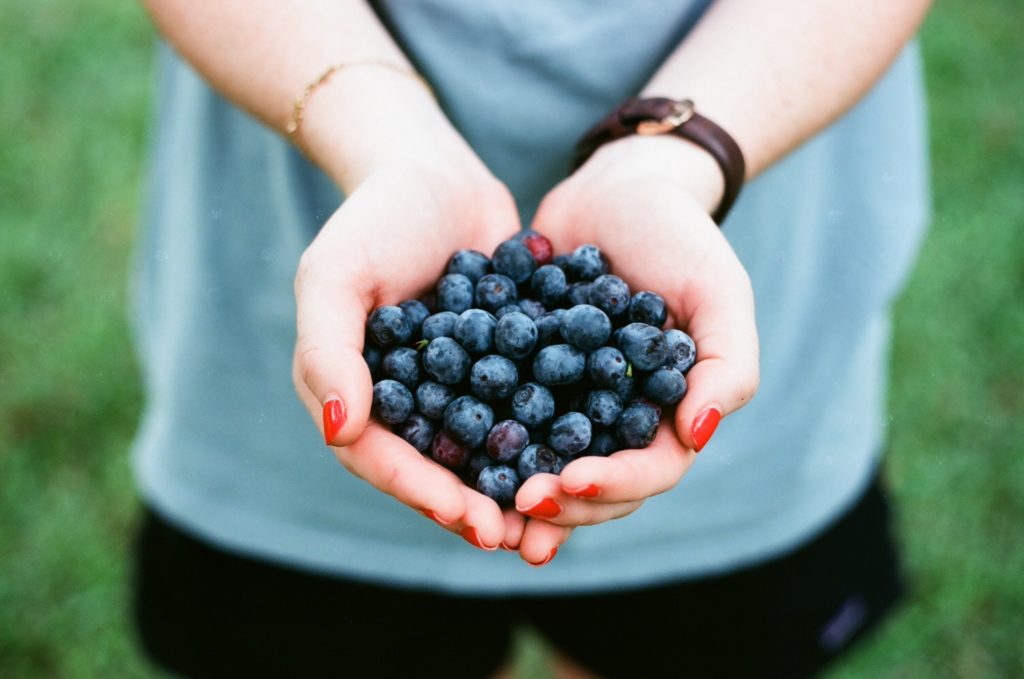Caleb Goldberg, New Roots, Inc. 2021 SummerWorks Intern
In the few weeks I have been working for New Roots, I have handled a lot of fresh produce. From broccoli to squash to lettuce, I frequently find myself in awe of just how many delicious, nutritious goods can be grown right here within a 50 mile radius of Louisville. Of all the fruits and vegetables included within New Roots shares, perhaps the ones eliciting the most joy within myself as well as the shareholders are the blueberries. There is something comforting about moving your gloved fingers around a handful of the delicate yet firm, brightly-colored orbs knowing that someone will be transfixed by their rich sweetness, totally untainted by commercial storage, within a few hours. New Roots places importance not just on what the produce is but also where it comes from, so I have decided to delve into the process which brings the blueberries to ourselves and our shareholders.
New Roots’ blueberries start their journey out at Blueberry Hills Nursery in Edmonton, KY. This farm and nursery is overseen by Chris and Hope Cash. Though they have found themselves living very busy and eventful lives on the farm, they have taken the time to communicate with me digitally about what farming blueberries is like. Hope notes that the pair is involved with the farm, but Chris works at Henkel doing maintenance while Hope focuses primarily on farm life. In addition to New Roots, the farm also supplies blueberries to individuals in Louisville and Lexington, as well as to Kentucky schools and the Bounty of the Barrens Market. They also provide blueberry plants to gardeners, and have grown flowers, strawberries, garlic, asparagus, and other vegetables as well. Hope and Chris’ nine seasons at Blueberry Hills have been “a lot of work, but a great experience,” explains Hope.

Among the responsibilities included in her daily life are weeding, mowing, and pruning, but she assures me that “with friends it isn’t bad.” Even if not bad, farming certainly isn’t easy, however. “Be prepared to follow through. Labor today is spotty sometimes, if you are not willing to do it yourself, don’t do it,” Hope warns anyone considering a future career in agriculture. Indeed, there is no denying that farming is not for the faint of heart. It can be quite the challenge to find the time and effort to get everything done. This year, Hope faced a shortage of workers available to pick blueberries. Consequently, she remarks, “on top of mowing, packaging, selling, watering, I have found myself a picker at least two days a week. I love picking, but that leaves less time to accomplish the rest!” A constantly changing world and constantly changing customer expectations mean that there is a regular requirement for change and innovation. Since Hope and Chris first found themselves in Blueberry Hills, Hope explains that they have added a high tunnel greenhouse, tried new crops, and changed the packing and refrigeration. Even when blueberries are not in season, Hope and Chris are not at rest. The fields still must be mowed regularly, and the bushes must be pruned. “We spend about 80 hours pruning old cains for new growth!” exclaims Hope.
Yet at the end of the day, Hope certainly does not regret all of her time at Blueberry Hills. There are incredible perks, she explains, “like the amazing views, fishing in the pond, nature galore to explore, hiking, playing…” Of course, this isn’t even going into perhaps the greatest benefit of having one’s own farm, or knowing someone who does: the food. Relative to store-bought blueberries, emphasizes Hope, the ones she grows have “way better shelf life, taste, control of sprays or lack thereof. I feel good knowing where my food came from!” As someone passionate about food justice, good health, and of course flavor, I completely agree with her assessment. There is something relieving about understanding exactly where one’s food comes from, and knowing for a fact that it was grown using safe, humane methods. The fresh flavor is an added bonus!

Hope’s comments are invaluable not only because they share insight into the food New Roots shareholders get access to, but also because Hope is nearing the end of the chapter of her life which said insight applies to. This is her and Chris’ last season at Blueberry Hills. Before the upcoming growing season, the pair is selling the farm and will shift focus towards growing annual flowers. Hope still gets those feelings of farm-related fulfillment from her new niche, and she finds it less time-consuming to boot. She looks forward to spending more time in the summer with her children in future growing seasons. Fortunately, the days of fresh, delicious blueberries are not coming to a close, though. Blueberry Hills will continue providing for Kentucky under new ownership in the seasons to come. Hearing from Hope about life at the farm has only furthered my appreciation for just how much work must be done to give us the food we need and enjoy. It also shows just how lucky this region is to have an organization like New Roots that makes such food all the more accessible.





Love this amazing documentary!!!
Well written and so very informative.